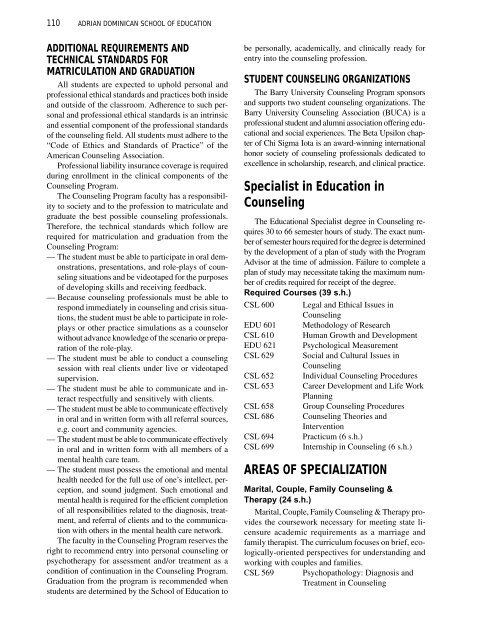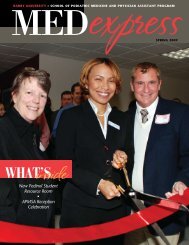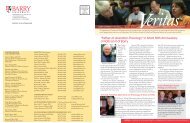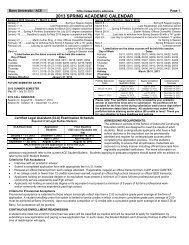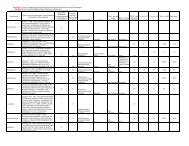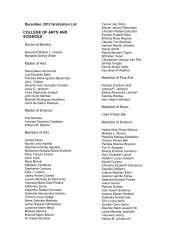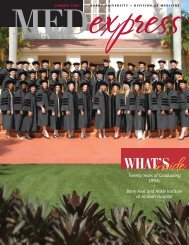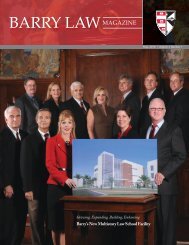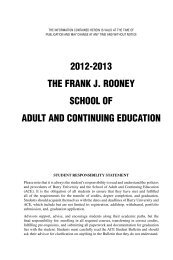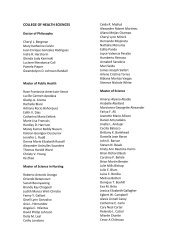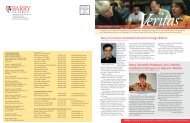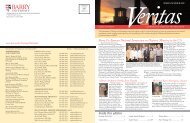2004-2005 - Barry University
2004-2005 - Barry University
2004-2005 - Barry University
You also want an ePaper? Increase the reach of your titles
YUMPU automatically turns print PDFs into web optimized ePapers that Google loves.
110 ADRIAN DOMINICAN SCHOOL OF EDUCATION<br />
ADDITIONAL REQUIREMENTS AND<br />
TECHNICAL STANDARDS FOR<br />
MATRICULATION AND GRADUATION<br />
All students are expected to uphold personal and<br />
professional ethical standards and practices both inside<br />
and outside of the classroom. Adherence to such personal<br />
and professional ethical standards is an intrinsic<br />
and essential component of the professional standards<br />
of the counseling field. All students must adhere to the<br />
“Code of Ethics and Standards of Practice” of the<br />
American Counseling Association.<br />
Professional liability insurance coverage is required<br />
during enrollment in the clinical components of the<br />
Counseling Program.<br />
The Counseling Program faculty has a responsibility<br />
to society and to the profession to matriculate and<br />
graduate the best possible counseling professionals.<br />
Therefore, the technical standards which follow are<br />
required for matriculation and graduation from the<br />
Counseling Program:<br />
— The student must be able to participate in oral demonstrations,<br />
presentations, and role-plays of counseling<br />
situations and be videotaped for the purposes<br />
of developing skills and receiving feedback.<br />
— Because counseling professionals must be able to<br />
respond immediately in counseling and crisis situations,<br />
the student must be able to participate in roleplays<br />
or other practice simulations as a counselor<br />
without advance knowledge of the scenario or preparation<br />
of the role-play.<br />
— The student must be able to conduct a counseling<br />
session with real clients under live or videotaped<br />
supervision.<br />
— The student must be able to communicate and interact<br />
respectfully and sensitively with clients.<br />
— The student must be able to communicate effectively<br />
in oral and in written form with all referral sources,<br />
e.g. court and community agencies.<br />
— The student must be able to communicate effectively<br />
in oral and in written form with all members of a<br />
mental health care team.<br />
— The student must possess the emotional and mental<br />
health needed for the full use of one’s intellect, perception,<br />
and sound judgment. Such emotional and<br />
mental health is required for the efficient completion<br />
of all responsibilities related to the diagnosis, treatment,<br />
and referral of clients and to the communication<br />
with others in the mental health care network.<br />
The faculty in the Counseling Program reserves the<br />
right to recommend entry into personal counseling or<br />
psychotherapy for assessment and/or treatment as a<br />
condition of continuation in the Counseling Program.<br />
Graduation from the program is recommended when<br />
students are determined by the School of Education to<br />
be personally, academically, and clinically ready for<br />
entry into the counseling profession.<br />
STUDENT COUNSELING ORGANIZATIONS<br />
The <strong>Barry</strong> <strong>University</strong> Counseling Program sponsors<br />
and supports two student counseling organizations. The<br />
<strong>Barry</strong> <strong>University</strong> Counseling Association (BUCA) is a<br />
professional student and alumni association offering educational<br />
and social experiences. The Beta Upsilon chapter<br />
of Chi Sigma Iota is an award-winning international<br />
honor society of counseling professionals dedicated to<br />
excellence in scholarship, research, and clinical practice.<br />
Specialist in Education in<br />
Counseling<br />
The Educational Specialist degree in Counseling requires<br />
30 to 66 semester hours of study. The exact number<br />
of semester hours required for the degree is determined<br />
by the development of a plan of study with the Program<br />
Advisor at the time of admission. Failure to complete a<br />
plan of study may necessitate taking the maximum number<br />
of credits required for receipt of the degree.<br />
Required Courses (39 s.h.)<br />
CSL 600 Legal and Ethical Issues in<br />
Counseling<br />
EDU 601 Methodology of Research<br />
CSL 610 Human Growth and Development<br />
EDU 621 Psychological Measurement<br />
CSL 629 Social and Cultural Issues in<br />
Counseling<br />
CSL 652 Individual Counseling Procedures<br />
CSL 653 Career Development and Life Work<br />
Planning<br />
CSL 658 Group Counseling Procedures<br />
CSL 686 Counseling Theories and<br />
Intervention<br />
CSL 694 Practicum (6 s.h.)<br />
CSL 699 Internship in Counseling (6 s.h.)<br />
AREAS OF SPECIALIZATION<br />
Marital, Couple, Family Counseling &<br />
Therapy (24 s.h.)<br />
Marital, Couple, Family Counseling & Therapy provides<br />
the coursework necessary for meeting state licensure<br />
academic requirements as a marriage and<br />
family therapist. The curriculum focuses on brief, ecologically-oriented<br />
perspectives for understanding and<br />
working with couples and families.<br />
CSL 569 Psychopathology: Diagnosis and<br />
Treatment in Counseling


